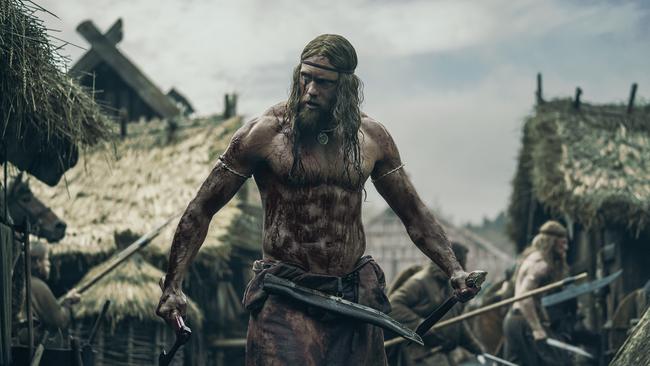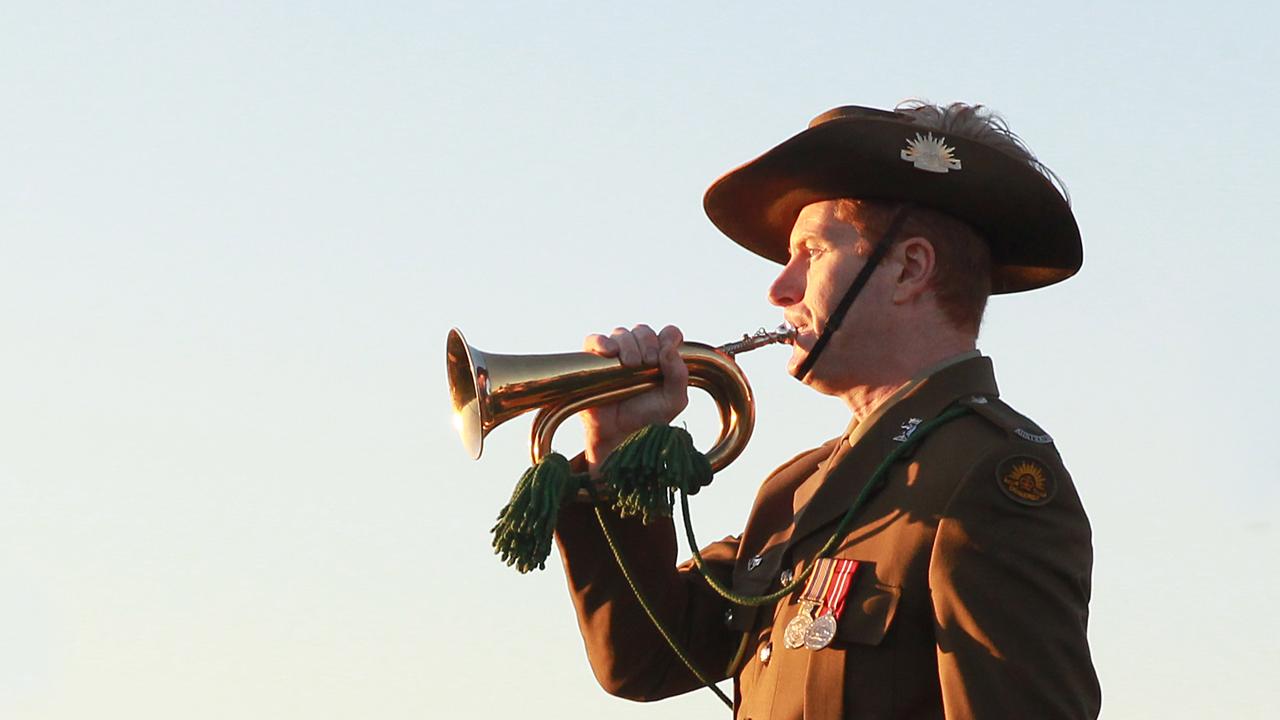The Northman a bloodied disappointment
It doesn’t help that, for a lot of the time, the characters don’t deliver dialogue but instead let loose with animalistic roars.

The Northman (MA15+)
In cinemas
★★½
One of the greatest cinematic thrills of my late teens was the climax of Richard Fleischer’s rousing adventure, The Vikings (1958); this was the nailbiting sequence in which one-eyed Kirk Douglas fought one-armed Tony Curtis in a broadsword battle to the death on the ramparts of a castle overlooking the sea, the survivor to claim the hand of Janet Leigh.
Robert Eggers, who co-scripted and directed the latest Viking movie, The Northman, doesn’t make that kind of movie; his previous films – The Witch (2015) and The Lighthouse (2019) – were steeped in myth and mystery, dark movies on bleak subjects, but, in their own way, compelling. With The Northman, Eggers has entered big-budget territory; it’s a lavish, 2¼ hour, $US90m epic filmed mostly on location in Iceland and set in 895AD, when Vikings terrorised Northern Europe.
The director and his regular cinematographer, Jarin Blaschke, go for realism. In practice that means the interiors (castles, huts) are lit only by candles or blazing fires and the exteriors are gloomy – grey skies, snow, mud, rain.
For a narrative, Eggers and co-screenwriter Sjon have drawn on a variety of sources, mainly the legend that inspired Hamlet. Aurvandil (Ethan Hawke) rules the kingdom of Hrafnsey but he’s frequently absent. His latest return is welcomed by his Queen, Gudrun (Nicole Kidman), and young son Amleth (Oscar Novak), though the court jester (Willem Dafoe) hints that something is rotten in the state of Hrafnsey. Sure enough, no sooner has Amleth sworn to avenge his father if the worst comes to the worst, Aurvandil is transformed into a pin cushion of arrows (like Toshiro Mifune in Akira Kurosawa’s take on Macbeth, Throne of Blood, 1957) and then beheaded by his evil half-brother Fjolnir (Claes Bang). Amleth escapes and several years later has been transformed into muscular, hairy Alexander Skarsgard who, after taking part in a spectacularly staged attack on a Slavic village, infiltrates Fjolnir’s encampment, posing as a slave, and sets about taking his revenge. He also finds time to dally with fellow slave Olga (Anya Taylor-Joy) and encounters a mysterious witch, (Bjork) among other weird characters.
The film evokes not only Hamlet but also Macbeth (the flock of crows could have flown in from Joel Coen’s The Tragedy of Macbeth) and Roman epics like Spartacus and Gladiator (slaves forced to fight to the death to amuse their masters). There’s even a reference to the Soviet war film Come and See (1985) in a grim scene in which villagers are locked into a burning barn. None of this is very original, and much of it is surprisingly dull. It doesn’t help that, for a lot of the time, the characters don’t deliver dialogue but instead let loose with animalistic roars; Nicole Kidman’s Queen is relatively restrained, but most of the men in the film over-act shamelessly.
There are some powerful scenes, not least the inevitable final encounter between Amleth and his uncle at the foot of an erupting volcano known as The Gate of Hell. But overall, despite the lavish treatment, the film is surprisingly dreary. Though there is a plot twist in the later stages, it doesn’t compensate for the excessive time spent with so many unlikeable characters in such an excessively violent and downbeat saga.
-
Petite Maman (PG)
In cinemas from Thursday
★★★★
If ever a film was difficult to categorise it’s Celine Sciamma’s sublime Petite Maman (Little Mother). Is it about childhood friendship? About the bonds between children and their parents? About grief and loss? Is it, perhaps, a time travel movie? It’s all of these, and more.
As the film begins, eight-year-old Nelly (Josephine Sanz) is devastated by the death of her maternal grandmother. Her mother, Marion (Nina Meurisse), and her amiable dad (Stephane Varupenne) travel separately to the grandmother’s isolated house in a forest where they will stay for a few days to sort things out. This is where Marion grew up and Nelly is fascinated to hear her mother talk about her childhood, especially about the house she built out of logs and sticks when she was Nelly’s age.
Then Marion departs, abruptly, leaving Nelly in the care of her dad with whom she has a lovely relationship (there’s a beautiful scene in which she watches him as he shaves his beard; earlier, sitting in the back seat of the car Marion is driving, she pops snacks into her mother’s mouth; clearly the child is very close to both parents).
One day, exploring the autumnal forest, Nelly encounters a little girl who looks uncannily like her. The girl, also aged eight, is named Marion, and is played by Gabrielle Sanz, Josephine’s twin. Marion is building a wooden house; she lives with her mother in a house almost identical to the grandmother’s house.
Both houses share the same long, central corridor and the same rooms. But the furnishings are different and we realise that eight-year-old Marion is living in another time. The girls accept this miracle unquestioningly, almost as though it was perfectly normal. They devote their time together to having fun – making crepes and generally mucking about. But time is short and events conspire to separate the girls. Sciamma’s exploration of both the anxieties and the fantasies of these children is extremely perceptive.
This mysterious story of a child encountering her own mother in the past is beautifully realised. The children give outstanding performances, and the theme is handled with delicacy and a sense of something like wonder.

-
Mother Mountain (M)
In cinemas
★★★½
The writer-director of Mother Mountain, Celina Stang, dedicates the film “for my mother, my first true love”. There is, then, presumably a level of autobiography in this Australian movie.
Selene (Emilie Cocquerel), a writer, and her partner, Dean (Fayssal Bazzi), have relocated from Sydney to the coastal town of Tilba Tilba and are moving into a house in the foothills of Gulaga, “mother mountain” to the local Indigenous people.
Selene is a troubled soul, restless and unfocused. Dean is not the easiest of partners; a flirt, he is pretty thoughtless. But the pair have every hope of starting a new life in this magical place, a place venerated by the local Aboriginal community.
Instead of settling down to writing, Selene accepts a job as mate on a trawler owned by Jonah (Damion Hunter) and discovers that she thoroughly enjoys life at sea.
Meanwhile Shani (Willow Speers), Selene’s daughter from a previous relationship, forms a close friendship with Ren (Jarrah Finneran), an Aboriginal boy, when he gives her support after she is bullied by some of the other kids because of her Jewish background.
Selene has had a fractious relationship with her parents (Anne Lambert, Pip Miller) and when they unexpectedly pay a visit she isn’t exactly joyful.
Tapping into two deeply-held faiths, Jewish and Aboriginal, two races that have suffered appallingly at the hands of Aryans, the film is steeped in cross-cultural themes. Handsomely photographed by Radek Ladczuk and confidently acted by the entire cast, this is a fresh and distinctive local production.




To join the conversation, please log in. Don't have an account? Register
Join the conversation, you are commenting as Logout